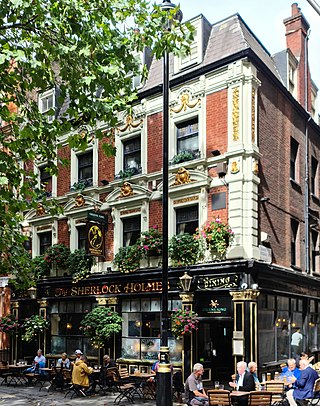
The Carlton Club is a private members' club in St James's, London. It was the original home of the Conservative Party before the creation of Conservative Central Office. Membership of the club is by nomination and election only.

A gentlemen's club is a private social club of a type originally set up by men from Britain's upper classes in the 18th and succeeding centuries.
The Savage Club, founded in 1857, is a gentlemen's club in London, named after the poet, Richard Savage. Members are drawn from the fields of art, drama, law, literature, music or science.

The Travellers Club is a private gentlemen's club situated at 106 Pall Mall in London, United Kingdom. It is the oldest of the surviving Pall Mall clubs and one of the most exclusive, having been established in 1819. It was described as "the quintessential English gentleman's club" by the Los Angeles Times in 2004.

The Devonshire Club was a London gentlemen's club which was established in 1874 and was disbanded in 1976. Throughout its existence it was based at 50 St James's Street. The major Liberal club of the day was the Reform Club, but in the wake of the 1868 Reform Act's extension of the franchise, the waiting list for membership from the larger electorate grew to such an extent that a new club was formed to accommodate these new Liberal voters. The clubhouse was on the western side of St James's Street. The original intention was to call it the 'Junior Reform Club', along the model of the Junior Carlton Club formed in 1866, but complaints from the Reform Club's members led it to being named the Devonshire, in honour of its first chairman, the Duke of Devonshire, an aristocrat from a long line of Liberals.

The University Pitt Club, popularly referred to as the Pitt Club, the UPC, or merely as Club, is a private members' club of the University of Cambridge. It was formerly male-only, and has admitted women since 2017.

The Oxford University Liberal Democrats is the student branch of the Liberal Democrats for students at the University of Oxford, with the purpose to support, develop, improve and promote the policies and candidates of the Liberal Democrats and liberal values within Oxford and the university.

St Stephen's Club was a private member's club in Westminster, London, founded in 1870.

The Anglo-Belgian Club was a private members' club located in Northumberland Avenue, London.
The Unionist Club was a short-lived London gentlemen's club, now dissolved, which was established in 1886, and had wound up by 1892. For the last four years of its existence, it had a clubhouse at 66-68 Pall Mall.

The Junior Carlton Club was a London gentlemen's club, now dissolved, which was established in 1864 and was disbanded in 1977.

The Conservative Club was a London gentlemen's club, now dissolved, which was established in 1840. In 1950 it merged with the Bath Club, and was disbanded in 1981. From 1845 until 1959, the club occupied a building at 74 St James's Street.
The Junior Constitutional Club was a political London gentlemen's club founded in 1887, and located at 101 Piccadilly. It was aligned to the Conservative party, with members having to pledge support. Heavy over-subscription for the Constitutional Club which had opened in 1883 led to the creation of a further mass-membership Conservative club.
The Palace Club was a short-lived political London gentlemen's club founded in 1882. It was aligned to the Conservative party, with members having to pledge support. Unlike many of the better-established clubs like the Carlton, or some of the new clubs like the Constitutional, it never acquired a sizable membership; according to Whittakers Almanack it had only 220 members in 1890, and 250 by 1900. It closed within a decade.
Arthur's was a London gentlemen's club, now dissolved, which was established in 1811 and was disbanded in 1940. Between 1827 and 1940 it was based at 69 St James's Street. It is now best remembered for having built the London clubhouse currently occupied by the Carlton Club.

The Athenaeum is a private members' club in London, founded in 1824. It is primarily a club for men and women with intellectual interests, and particularly for those who have attained some distinction in science, engineering, literature or the arts. Humphry Davy and Michael Faraday were the first chairman and secretary and 51 Nobel Laureates have been members.
The Eccentric Club is the name of several London gentlemen's clubs, the best-known of which existed between 1890 and 1986. For much of its history it was based at 9–11 Ryder Street, St James's. The current Club was founded in 2008.

The United Service Club was a London gentlemen's club founded in 1815 for the use of senior officers in the British Army and Royal Navy – those above the rank of Major or Commander – and the club was accordingly known to its members as "The Senior". The club closed in 1978.

The Sherlock Holmes is a Victorian-themed public house in Northumberland Street near Charing Cross railway station and Trafalgar Square which contains a large collection of memorabilia related to the fictional detective Sherlock Holmes. The original collection was put together for display in Baker Street in London during the Festival of Britain in 1951.














